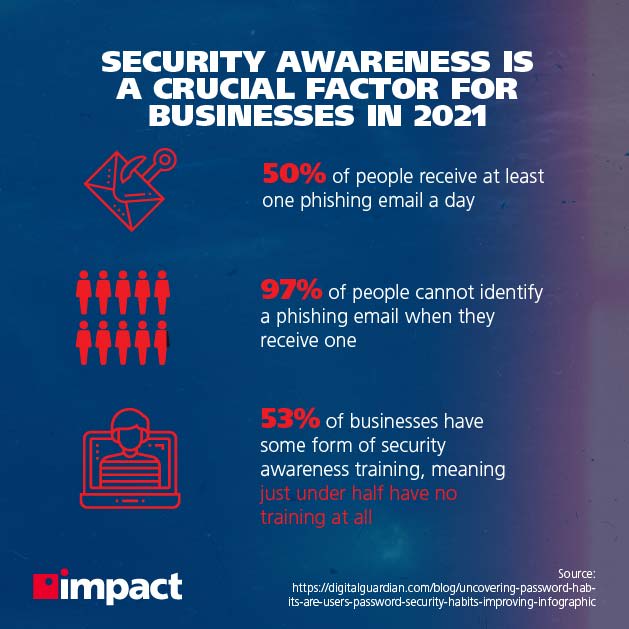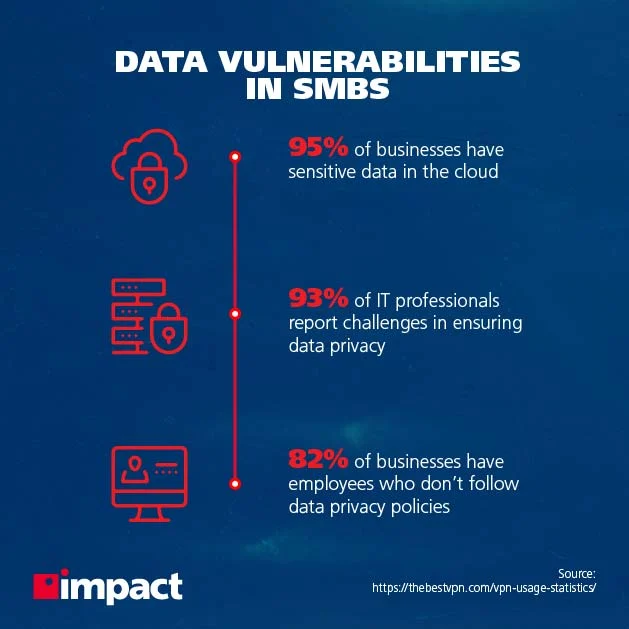What Is Small Business Managed Security?
A managed security service provider (MSSP) is an outsourced manager for a business’ IT security needs. Think of it an as extension of the capabilities of the services offered by a managed service provider (MSP).
Just for clarification for these acronyms, an MSP like Impact Networking provides a whole suite of managed IT services for businesses, including cloud-based ERPs and remote monitoring capabilities. MSPs will typically offer a form of cybersecurity to help SMBs with their basic needs.
An MSSP is focused solely on the security of a business’ IT infrastructure. Here at Impact, for example, we offer our MSSP services as an add-on or a standalone option for advanced cybersecurity.
MSSPs have recently gained prominence in recent years as SMBs become more aware of the potential effects of a cyberattack.
While MSPs have been catering for the IT needs of organizations for many years, the need for a more advanced cybersecurity program to meet modern threats is a relatively new phenomenon.
In the case of IT security solutions for small and mid-sized companies, the need has grown substantially over the last few years, particularly in the wake of the pandemic.
Whether it’s phishing, malware, ransomware, or user error, the potential for serious breaches in the security of SMBs is growing.
This is particularly the case when you consider the drastic changes that are happening in the landscape of digital transformation, leading to a growth in popularity for the managed security services business model.
Related Post: 6 Lessons Learned From Recent Data Breaches
Many small businesses are underprepared to face modern security challenges (71% of SMBs are not prepared for cybersecurity risks) and those with in-house IT security teams are finding it difficult to keep up—it should come as no surprise that the MSSP market is expanding significantly.
96% of IT decision makers believe their organizations are susceptible to external cyberattacks.
The Advantages of Small Business Managed Security
Expertise
Decision makers who are serious about cybersecurity and the health of their tech infrastructure are often wary about the level of expertise required to implement and maintain a strong defense.
During the initial stages of auditing, you can expect the following during the assessment phase from an MSSP offering small business managed security:
- Vulnerability Scanning: Scan systems to find security flaws
- Penetration Testing: Exploit flaws identified during vulnerability scanning
- Results are documented in a cybersecurity risk assessment report and delivered with raw results to the client
This allows an MSSP to conduct an accurate analysis of a business’ cybersecurity and make recommendations on the necessary solutions to ensure a solid cybersecurity strategy.
Many SMBs are shifting towards managed security plans because of the expertise they can provide. With an MSSP, you can get the same level of quality of an in-house team for a fraction of the cost.
For example, with our offering, we provide the following experts as part of our service:
- Cybersecurity Analyst (CSA)
- Execute assessment tasks and curate/analyze resulting data
- Perform daily monitoring tasks for deployed cybersecurity solutions
- Cybersecurity Engineer (CSE)
- Responsible for final assessment solution implementation
- Cybersecurity Developer (CSD)
- Develop and maintain custom managed IT security (MITSec) assessment and pricing tools
- Work with the organization to improve and automate the MITSec process
- Compliance Manager
- Develop solutions and strategies to incorporate compliance into MITSec
- Define team members and services to address client compliance concerns
Hiring this level of expertise is not a viable option for many growing SMBs that need a cybersecurity strategy in place.
With a managed security plan, an expert team can be brought on-board for a fixed monthly price that’s far more inexpensive than hiring an in-house team.
Not to mention that a good MSSP will have a wealth of experience to draw from and the ability to keep up with the constantly changing cybersecurity landscape.
Comprehensive protection
Small business managed security services are built from the ground up to provide additional cybersecurity options beyond the typical remit of MSP offerings.
While MSPs offer comprehensive management and a basic level of security, a good MSSP solution will actively monitor and defend your network, storage, and applications.
Nearly half of all cyberattacks target SMBs, a number which is expected to increase.
There are several services which are offered by MSSPs today. You should expect the following effective security solutions:
- Log (SEIM)/packet (NDR) monitoring
- Next-gen antivirus
- Endpoint detection and response (EDR)
- DNS/website/domain protection
- Multi-factor authentication (MFA)
- Security awareness training
- Next-gen networking hardware (UTM)
- Continuous vulnerability monitoring
- Spam filtering and email encryption
Many small businesses are not used to having to deal with the amount of threats that exist today, and IT staff find themselves overstretched and putting out fires to keep company systems operational.
An advanced and comprehensive plan for cybersecurity gives a lot more options for protection, not to mention helping bring a business in compliance with new and emerging regulations.
Related Post: New York's SHIELD Act: What It Means for Businesses
Efficiency
It may not be immediately apparent to SMB decision makers whose first priority is to shore up their cybersecurity, but efficiency is a key factor to be considered when partnering with an MSSP.
Implementing integrated security functions eliminates silos in an organization, leading to faster response times, improving communications channels between departments, and reducing the possibility of human error.
Automation also plays a huge part in the operations of an MSSP service. In a time where cyber criminals themselves are using automation as a means to probe for emerging vulnerabilities in businesses, cybersecurity needs to take advantage of automated technology and machine learning to protect against these threats.
The global market for managed security services was $24 billion last year—by 2023, it is expected to have nearly doubled to almost $48 billion.
This can come in a number of forms, like operational analytics giving insight into potential red flags and weak points.
With round-the-clock monitoring, a dedicated Virtual Chief Information Security Officer (vCISO)—much like a vCIO provided by an MSP—is able to keep abreast of any emerging issues a business network might have.
Their job is to provide small business cybersecurity consulting services for SMBs and give guidance on their strategies.
Using modern cybersecurity tools, a managed security service provider can drastically improve the efficiency of an organization’s cyber defense, meaning a more streamlined business and alleviating IT staff of dealing with threats on their own.
Reduced cost
One of the primary considerations for SMBs seeking managed security services for small businesses is cost.
As more companies look to ensure that their infrastructures are ready for digital transformation, the additional costs incurred from a comprehensive cybersecurity strategy might seem daunting at first.
In fact, it’s common for small businesses to ignore modern cyber threats altogether.
This is typically because they either do not think cyber criminals would target SMBs, security isn’t a top priority, or they believe their existing spend on IT is already too much.
The truth is that nearly half of all cyberattacks are on SMBs, and of those that succumb to a data breach, the average cost is $5 million. The majority of businesses who suffer a cyberattack fold within six months.
Put simply, the chances of an attack on an SMB are significantly higher than some might expect, and the cost of cleaning up a data breach far outweighs the cost of hiring a cybersecurity provider to prevent one.
In addition, hiring an in-house dedicated cybersecurity expert is not cheap, with salaries ranging upwards of $80,000. And that’s just one additional staff member—hiring an entire team can set back a small business several times that sum every year.
The Bottom Line: Outsourcing Managed Security Services
The importance of cybersecurity will continue to grow as the landscape evolves and new threats emerge for SMBs.
The demand for cloud-based services in particular has meant increased vulnerabilities for businesses without a secure network in place.
A strong MITSec component for organizations is now a necessity which should be accommodated as best as possible. Investing in a strategy to help defense against these threats is more important than ever.
Impact Networking’s Managed Security program provides vital cybersecurity protection for clients, keeping their minds at ease in the knowledge that their IT infrastructure is being monitored and maintained by our security experts.
We’ve vetted 100s of vendors to ensure that our program utilizes best-in-class solutions for our clients. In today’s landscape, a comprehensive cybersecurity program has never been more important. Learn more about Impact’s managed cybersecurity services.


